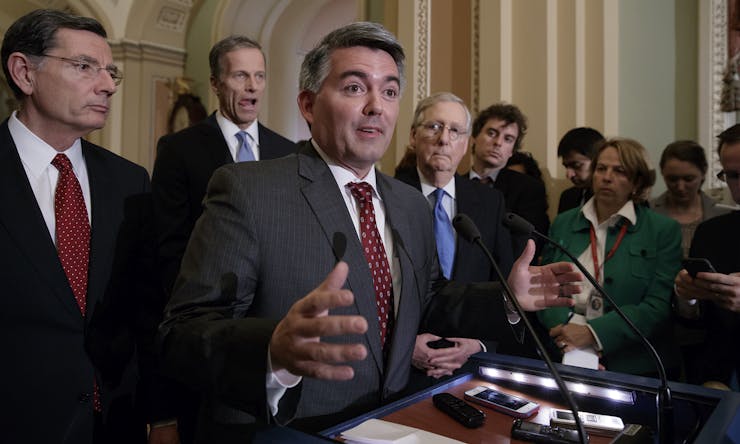The sweeping tax bill passed by the US Senate over the weekend contains all sorts of giveaways to businesses, from generous write-offs for factories and equipment to bargain-basement rates on offshore tax havens. But for all the boons to business it provides, the bill fails to deliver commonsense tax reform to the cannabis industry.
Two separate proposed amendments to the Senate tax bill would have ended a decades-old penalty that currently treats state-legal cannabis businesses like drug cartels. The rule, IRS Section 280E, prevents cannabis businesses from taking tax deductions available to other industries, often pushing their effective tax rates to more than 70%.
Ending the penalty has high-profile supporters on both sides of the aisle, including Sens. Rand Paul (R-KY) and Ron Wyden (D-OR). But as the Senate tax vote approached, Sen. Cory Gardner (R-CO), who sponsored the two amendments, withdrew his proposals after noting the plan’s price tag. “Cory Gardner says it scores at $5B and will be a lot more if all 50 states legalize,” reported Bloomberg’s Steven Dennis.
If cannabis “scored” at $5 billion—which means the nonpartisan Congressional Budget Office estimates that it would remove $5 billion from the federal budget over the next decade—it would be among the few parts of the tax bill that were scored at all before the Senate’s vote. Gardner’s quote also raises the question: If all 50 states legalize, why would the federal government continue to treat licensed cannabis businesses like illegal drug cartels?
“It’s time for the federal government to allow Colorado businesses to compete.”
The final Republican tax bill—which is forecast to cost $1.4 trillion over the next decade—proceeded without so much as a vote on the cannabis amendments.
A day after abandoning his proposed cannabis provisions, Gardner, who voted for the tax bill, praised its passage. “For too long, too many Coloradans have felt left behind.” he said in a statement. “They have been forced to cope with a tax system that favors elites and gives advantages to those who know how to game the system.”
“We know workers bear much of the burden of the corporate tax rate,” he continued, “and lowering the corporate tax rate will lead to bigger paychecks for hardworking Coloradans.”
That’s a controversial claim among economists, but if Gardner believes it, it means he gave up on securing similar benefits for his constituents who work in cannabis. Colorado’s legal cannabis industry supports nearly 27,000 full-time jobs, according to a September analysis by Leafly.
Texas Republican Sen. John Cornyn did better for his corporate constituents. He introduced an amendment that secured a new, lower tax rate on certain income from oil and gas operators. Industry representatives, according to the New York Times, said that without the amendment, they would been excluded from benefits that other industries were getting. Sound familiar?
Gardner himself has acknowledged that 280E “puts thousands of legal marijuana businesses throughout Colorado at a disadvantage by treating them differently than other businesses across the state.” He’s called its removal “commonsense” and touted its bipartisan appeal. But in the wee hours Saturday morning, as senators scrambled to push through a controversial tax overhaul, Gardner didn’t even demand a vote.
Shop highly rated dispensaries near you
Showing you dispensaries nearThere’s still hope. While Gardner pulled back the amendments from the tax bill debate, a standalone Senate bill, S. 777, dubbed the Small Business Tax Equity Act, would achieve the same goal by exempting state-legal cannabis businesses from 280E. It’s been sitting in the Senate Finance Committee since March.
Gardner added himself as a co-sponsor last month. “Coloradans made their voices heard in 2012 when they legalized marijuana,” he said at the time, “and it’s time for the federal government to allow Colorado businesses to compete.”





